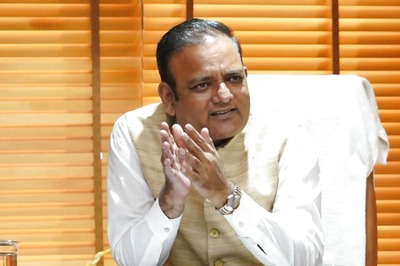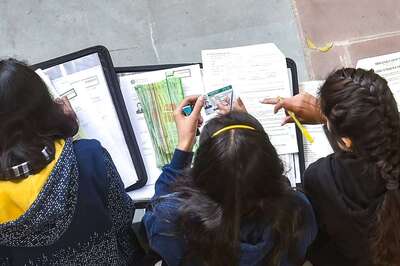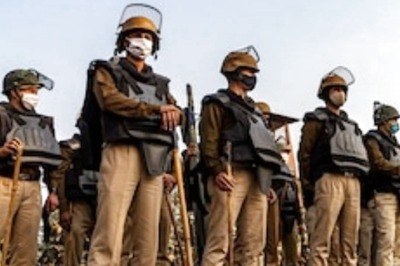
views
In a nail-biting scenario whose resolution could help determine the winner of a tumultuous, fraught presidential race, state election officials in Georgia continued Wednesday to count more than 200,000 outstanding ballots.
As of Wednesday night, about 40,000 votes separated the presidential candidates in Georgia, with President Donald Trump leading his Democratic rival, Joe Biden, by less than 1 percentage point.
Beyond the fate of the state’s 16 electoral votes, the uncounted ballots also kept some down-ticket races unresolved, leaving open the possibility that Democrats’ big dreams of transforming Georgia may founder this week in the face of the enduring popularity of the Republican Party in the South.
At the same time, the closely contested presidential race underscored the fact that this Deep South state, once a reliable Republican stronghold, has become a legitimate battleground.
The fact that so many ballots remained uncounted came as little surprise. Voters were allowed to deposit absentee ballots in county drop boxes until 7 p.m. Tuesday. The process of counting them is labor-intensive, involving manually removing ballots from envelopes and, in some cases, subjecting them to human review.
But there were also unwelcome surprises, most notably a pipe that burst Tuesday morning in State Farm Arena, where the Atlanta Hawks play basketball and where Fulton County was tabulating votes. The plumbing failure delayed the counting of an estimated 50,000 ballots.
The chairman of the Georgia Republican Party, David Shafer, said Wednesday night that his group planned to file lawsuits in as many as a dozen Georgia counties over potential irregularities in the way local elections boards were handling absentee ballots still being counted.
The state party, along with the Trump campaign, filed one such legal action Wednesday in superior court in Chatham County, claiming that at least 53 ballots were potentially mishandled by the local elections board.
The petition raises the possibility that some absentee ballots had been improperly handled and received by the Chatham County Board of Elections after Tuesday’s 7 p.m. deadline for receiving votes. Chatham County, in coastal southeast Georgia, is home to the city of Savannah.
The petition asks the court to issue an order that would force the local election board to “collect, secure and safely store” all absentee ballots it received after the deadline, and “provide an accounting” of the ballots, including the names of absentee voters and the times the ballots were received.
In a news conference Wednesday morning, Georgia’s secretary of state, Brad Raffensperger, said that the largest number of outstanding ballots, more than 70,000, was from Fulton County, which includes most of Atlanta and is a reliable Democratic stronghold. About 50,000 ballots were from DeKalb County, a Democratic-leaning area that also includes part of Atlanta.
Roughly 7,000 ballots were from Forsyth County, which voted heavily for Trump in 2016.
Raffensperger, a Republican and supporter of Trump, said he would pressure county officials in the state to complete its tally on Wednesday. But if a full vote count could not be finished, he added, he hoped that the number of uncounted ballots would be significantly reduced by the end of the day.
“If we don’t get there, but we get the number so small that then there’s no question of who actually the winner is, I think that will be really helpful, really remove a lot of those questions that people might have,” Raffensperger said.
On Wednesday evening, just six states remained unresolved, with Biden leading Trump, 253-214, in electoral votes.
Leading up to Election Day, there was not much Georgia’s Democrats and Republicans agreed upon, except for a prediction that the day would be a dramatic one, given the rising strength of Georgia Democrats and the state’s recent notoriety for electoral system meltdowns and brutally long lines.
They were correct — but not always in the ways some imagined. Fears of embarrassing and widespread polling place glitches, like the kind that marred the June primaries in Fulton County, the most populous county in the state, did not materialize; most Georgia voters virtually waltzed through the voting process on Tuesday.
The uncounted votes Wednesday also clouded the fate of a marquee U.S. Senate race between the incumbent, David Perdue, a Republican, and his Democratic challenger, Jon Ossoff. As of early Wednesday, Perdue led by about 155,000 votes. But with a Libertarian candidate pulling more than 2% of the vote, the possibility of a January runoff between the two leading candidates remained possible.
The state’s second high-profile Senate race is certainly headed to a runoff, with Sen. Kelly Loeffler, a Republican, and the Rev. Raphael Warnock, a Democrat, emerging as the two top performers in a crowded race Tuesday night.
Andra Gillespie, an associate professor of political science at Emory University, said that these short-term uncertainties could not obscure the new, emerging reality that Georgia was now a state where tough and bruising electoral battles were likely to be the new norm.
“I think regardless of who wins the presidential election and who ultimately wins the Senate races, it’s clear that Georgia is electorally competitive,” Gillespie said. “We are entering an era of Georgia politics where we’re probably going to see more races that are going to be decided by small margins — and an era where we are going to see Democrats and Republicans alternate.”
Republicans showed their continued strength not only in the presidential and Senate races, but also in the fight for control over the state Legislature, where they will continue to control both chambers, complementing Gov. Brian Kemp, a Republican.
Democrats fared better in two key congressional races in the northern suburbs of Atlanta. This vote-rich area was once easily dominated by Republicans. But growing diversity and a distaste for Trumpism, particularly among college-educated suburban women, has given Democrats a firm foothold there.
In the 6th Congressional District, Rep. Lucy McBath, a Democrat and outspoken gun-control advocate, defeated Karen Handel, her Republican challenger who briefly held the seat after winning a 2017 special election.
In the 7th Congressional District, Carolyn Bourdeaux, a Democrat, was leading Rich McCormick, a Republican, by about 2 percentage points with an estimated 95% of the votes reported.
The seat is being vacated by Rep. Rob Woodall, a Republican who has held the seat since 2011, but defeated Bourdeaux two years ago by fewer than 500 votes — a sign of growing Democratic strength in the suburbs.
Richard Fausset and Stephanie Saul c.2020 The New York Times Company
Read all the Latest News, Breaking News and Coronavirus News here




















Comments
0 comment